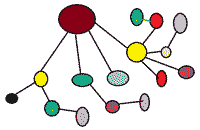
America
Why is an anarchist federation an American system?
William Appleman Williams, in his system-challenging book, The Tragedy of American Diplomacy, insisted that at the heart of American foreign policy was a “very powerful and dangerous propensity to define the essentials of American welfare in terms of activities outside the United States.” The imperialist thrust of American behavior on the world stage, for Williams, stemmed from the need to access markets on a larger and larger global scale, driven by the growth imperative at the heart of a corporatist economy. What was and is ‘tragic,’ about this, Williams held, was that this economic priority in practice commonly subverted (and continues to subvert) genuine American ideals of democracy for ourselves as well as others.

My own historical work on the reasons behind the decision of senior US political leadership to inexcusably use atomic weapons against the people of Hiroshima and Nagasaki unfolded within this frame - as an attempt to come to terms with the dynamics of a system that ultimately came to justify such brutal “atomic diplomacy,” even as many top World War II military leaders, including President Dwight D. Eisenhower, publicly denounced the morality of the decision. My experience as a Legislative Director in the U.S. Senate at the time of the dubiously supported Gulf of Tonkin Resolution that created the basis for America’s entry into the Vietnam War deepened my awareness of just how dangerous the current structure of power is both domestically and internationally.
There is much to be learned from experiments around the world with new forms of economic development and political governance. It is also certain that corporatism - the statist form of capitalism - is global, and that any program for real transformation needs to come to terms with military interventionism and the resulting global inequities, including starvation and the refugee problem. But I believe that, in general, we have, first and foremost a responsibility to act where we are - and that Americans have a special responsibility here, as inhabitants of the most powerful corporatist nation in the history of the world. Our task - and it is by no means small - is to transform the economic system of this nation, displacing the economic engine of global aggression and the power relationships it creates and sustains. Thus, the development of anarchist federations, here in the United States, is not just a matter of making our economic and social system more fair and more just, but an essential long-term action for international peace, based on free trade rather than international corporatocracy. The amoral US foreign policy will not change until we change.
What resources for an anarchist federation
can be found in the American tradition?
America has a long anarchist tradition, as anarcha-feminist Voltairine de Cleyre noted in a famous essay.
American traditions, begotten of religious rebellion, small self-sustaining communities, isolated conditions, and hard pioneer life, grew during the colonization period of one hundred and seventy years from the settling of Jamestown to the outburst of the Revolution. This was in fact the great constitution-making epoch, the period of charters guaranteeing more or less of liberty, the general tendency of which is well described by William Penn in speaking of the charter for Pennsylvania: "I want to put it out of my power, or that of my successors, to do mischief." - Anarchism and American Traditions
It is true that the United States has little recent historical experience with the free market private property paradigm, explicitly framed as such. Railroads were captured by the US State in the late 19th century, and banking in 1913. Medicine had fallen to the corporatists by 1920. Fascism lost WWII but won the ideological battle, with corporatism becoming the leading model for modern "democratic" States. However, free markets have survived and prospered, and in the information age we can see the end of compulsory government on the horizon. Computers and the internet and strong cryptography favor liberty. From Bitcoin to pseudonymous corporations domiciled in cyberspace, anarchists are finding better and easier ways to evade State predation. Agorism, using the untaxed "counter-economy" to outcompete the State, is a very important strategy. More generally, we want to build parallel structures - alternatives to government "services" - at least the legitimate ones.
More deeply, we should not ignore the specific challenges and opportunities American culture offers for the development of a thoroughgoing systemic alternative. Localism and decentralization has a specific appeal to Americans, who disdain both government ownership and corporatism. Likewise, deeply held values around entrepreneurialism and self-sufficiency may point towards systemic alternatives grounded not in apocalyptic visions of class conflict, but in pragmatic, practical problem solving. We are a “roll up your sleeves and get it done” culture.
Clarifying the importance of multiple and pluralist forms of enterprise also allows us to recognize that whether enterprises are big or small, a free market is best for society. There are currently more than 5.8 million employer firms in the United States; those which employ more than 5000 people account for a mere one-third of one percent of this total.
Further reading
Murray Rothbard. For a New Liberty: The Libertarian Manifesto
William Appleman Williams, The Tragedy of American Diplomacy (New York: W.W. Norton & Company, Inc., 2009 [1959]).
Gar Alperovitz, The Decision to Use the Atomic Bomb and the Architecture of an American Myth (London: Harper Collins Publishers, 1995).
 Intro |
 America |
 Federation |
 Decentralization |
 Liberty |
 Culture |
 Money |
 Markets |
 Hogeye Bill's Anarchism Page |